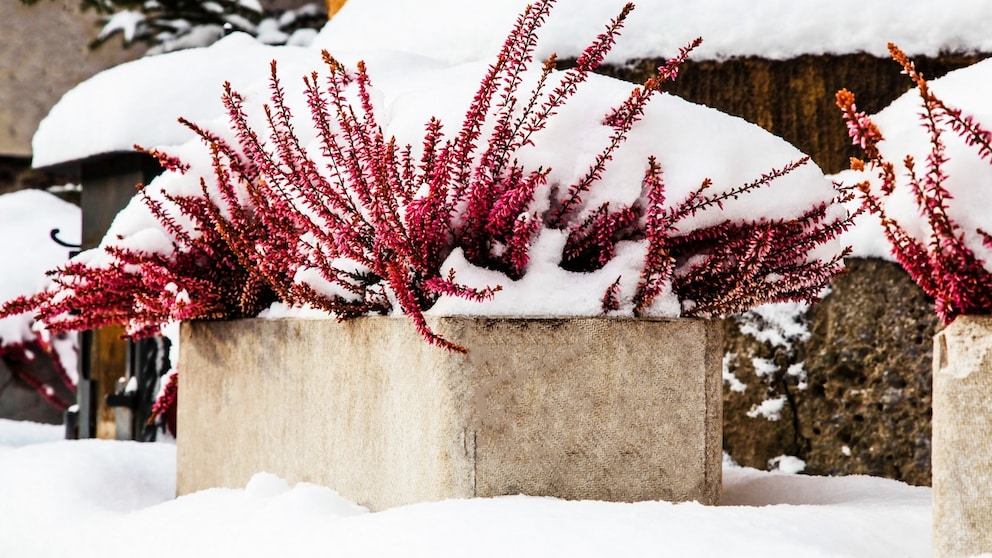December 16, 2024, 1:17 pm | Read time: 4 minutes
Snow is nothing more than water in a different aggregate state. As soon as the first snow falls in winter, many hobby gardeners probably ask themselves whether they still need to water their plants in the garden. Or can you save yourself the trouble when it’s below zero and snowing?
Even in the winter months, hobby gardeners can’t simply take a break because our plants in the garden need the right care during the cold season, too. Watering, in particular, should not be neglected, as both functional and ornamental plants need sufficient water all year round in order to survive. The weather plays a decisive role here: frozen soil can only absorb water with difficulty. But what happens if the garden is covered in a layer of snow? Does it make sense to water the plants despite the snow?
Overview
How Does Snow Affect Plants?
Snow in winter is something completely natural – and plants in the garden cope well with it, at least when it comes to native plants. In general, snow has a positive effect on them, as the snow cover has an insulating effect. This means they are better protected from the freezing cold in the winter months. The opposite would be the so-called bare frost, which is much more damaging. In this case, the plants are defenseless against the cold – there is a risk of frost damage.
An excessive snow load, on the other hand, can cause tree branches to break off. In this case, it is advisable to shake trees and shrubs a little so that they are not damaged by the weight.
Which Plants Need Watering in the Snow?
While some plants need extra care in winter and should be watered despite the snow, others cope well with the weather. What should you consider for garden plants, potted plants, and houseplants in winter?
Garden Plants
Hardy garden plants are well equipped to withstand the icy temperatures in winter. But many people don’t know this: The greater danger is not the freezing cold but the lack of water. As it snows rather than rains in winter – depending on the region – the moisture often does not reach the roots. This is because the meltwater often does not penetrate as deeply into the soil – especially when it is frozen.
If the sun shines after snowfall, the water evaporates before it seeps away. This means that plants do not get enough moisture when it snows, but this can be counteracted by watering. Evergreen garden plants, in particular, should, therefore, also be watered in winter, as they need plenty of moisture even during the cold months. However, other plants should also be protected from a lack of water.
Potted Plants
The advantage of (non-hardy) potted plants is that they can be moved to a warmer spot for the winter. Although they are protected from the snow and cold there, they still spend the time in their winter quarters with their vital functions turned down. As a rule, they then need less water – but you can’t do without it completely. Potted plants should be watered once a week. The rule of thumb here is: the colder it is, the less often you should water.
Tip: Just as important as the right care is the right location for the winter quarters. It should not be too warm or too dark. A bright stairwell, a shed with windows, or a cellar may be suitable.

Plant knowledge 6 hardy potted plants for the garden and balcony

Garden Maintenance Do I Have to Water the Lawn in Winter?

Lawn calendar How to care for your lawn in December
The Benefits of Snow for Houseplants
Of course, houseplants don’t usually get snow. However, this can be a good way to supply exotic indoor plants with soft or low-lime water. Just like rainwater, snow is naturally less hard than tap water, which is not good for orchids or azaleas, for example. Simply add a little snow to the plant pot, it will melt quickly due to the room temperature and the water will seep in. These tips should be followed when watering houseplants in winter:
- Only water when the soil feels dry to the touch. To be on the safe side, check whether the moist soil sticks to your finger. Watering too much will cause waterlogging, which is more harmful than watering too little.
- The water must not stand in the pot; otherwise, there is a risk of root rot. Always pour off excess water!
- Indoor plants need more water when the heating is turned up. It may then be worth misting the leaves with a spray bottle.
- It is better to put houseplants in a cooler place in winter.
- Ventilation is important in winter – but it can be harmful to houseplants. They should never be placed in a draught but rather in a sheltered corner.
Important: If you use snow to water houseplants, it must never contain road salt. This can quickly kill the plant.

